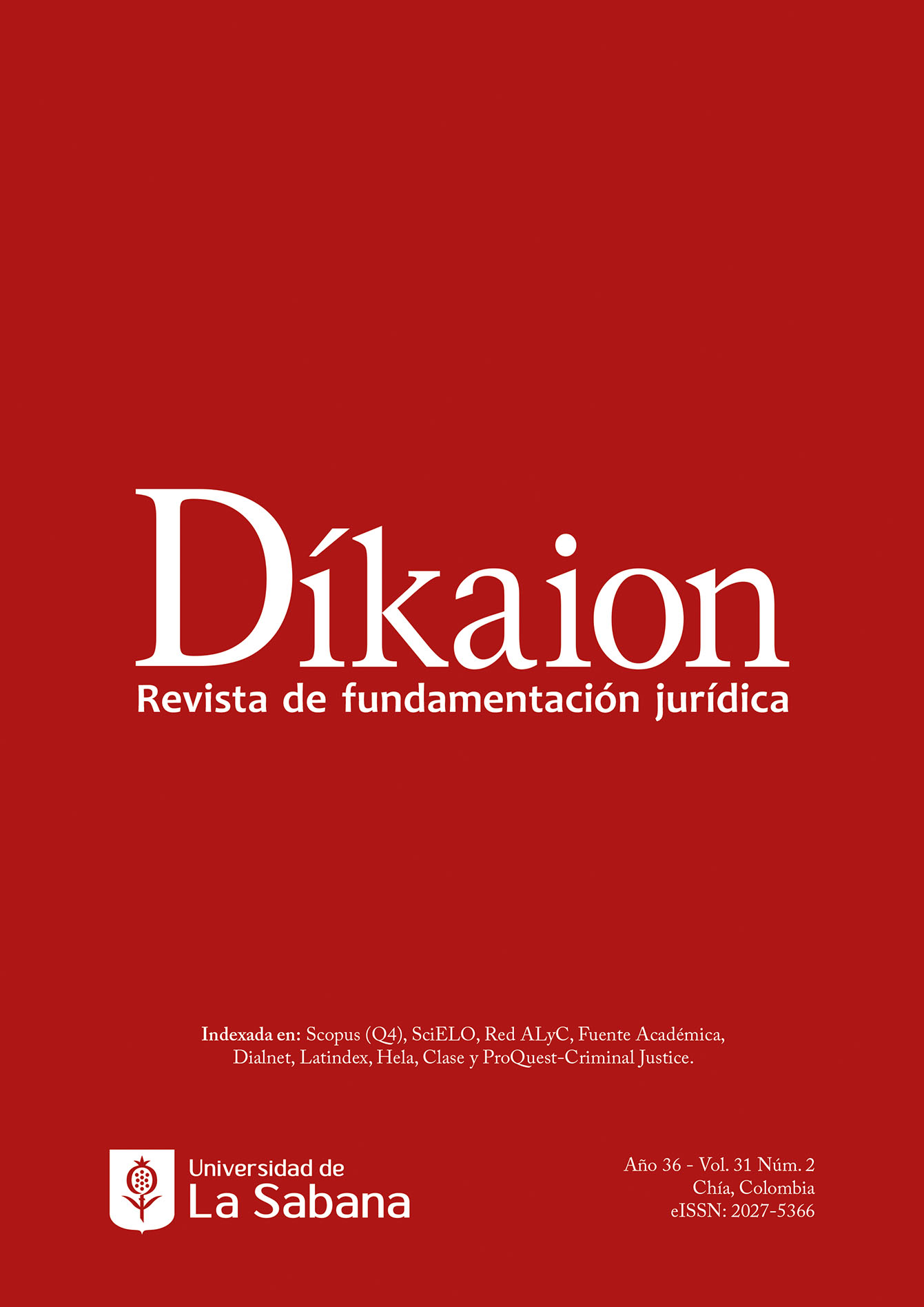Apertura ciudadana y legitimidad democrática de la justicia constitucional
DOI:
https://doi.org/10.5294/dika.2023.32.1.5Keywords:
control de constitucionalidad, legitimidad, democraciaAbstract
Reseña del libro: Jorge Ernesto Roa Roa, Control de constitucionalidad deliberativo: el ciudadano ante la justicia constitucional, la acción pública de inconstitucionalidad y la legitimidad democrática del control judicial al legislador, Bogotá, Universidad Externado de Colombia, 2019.
Downloads
References
Jorge Ernesto Roa Roa, Control de constitucionalidad deliberativo: el ciudadano ante la justicia constitucional, la acción pública de inconstitucionalidad y la legitimidad democrática del control judicial al legislador, Bogotá, Universidad Externado de Colombia, 2019
Bickel, Alexander M., The Least Dangerous Branch, New Haven, Yale University Press, 1996.
Bogdandy, Armin, von, “Ius constitutionale commune en América Latina. Aclaración conceptual”, en von Bogdandy, Armin, Mariela Morales Antoniazzi, Eduardo Ferrer Mac-Gregor, Ius constitutionale commune en América Latina. Textos básicos para su comprensión, Querétaro, Instituto de Estudios Constitucionales del Estado de Querétaro, 2016.
Cepeda-Espinosa, Manuel José, “Judicial activism in a violent context: The origin, role, and impact of the Colombian Constitutional Court”, en Washington University Global Studies Law Review 3 (529) (2004), pp. 537-700, en https://openscholarship.wustl.edu/law_globalstudies/vol3/iss4/2
Cepeda, Manuel José y David Landau, “Colombian Constitutional Law: Leading Cases”, en Carlos Bernal et al., “2018 global review of constitutional law: Colombia”, International Journal of Constitutional Law 17 (2017), Oxford University Press. DOI: https://doi.org/10.1093/law/9780190640361.001.0001
Corte Interamericana de Derechos Humanos, Caso Cabrera García y Montiel Flores vs. México, Sentencia de 26 de noviembre de 2010, Excepción Preliminar, Fondo, Reparaciones y Costas, Serie C, núm. 220, párr. 36.
Dixon, Rosalind, “Creating dialogue about socioeconomic rights: strong-form versus weak-form judicial review revisited”, en International Journal of Constitutional Law, 5 (3) (2007), p. 402. DOI: https://doi.org/10.1093/icon/mom021
Dixon, Rosalind, “Weak-form judicial review and American exceptionalism”, en Oxford Journal of Legal Studies 32 (3) (2012), pp. 487-506. DOI: https://doi.org/10.1093/ojls/gqs015
Ely, John Hart, Democracy and Distrust: A Theory of Judicial Review, Cambridge, Harvard University Press, 1980. DOI: https://doi.org/10.2307/j.ctv102bj77
Fallon, Richard H., “The Core of an Uneasy Case for Judicial Review”, en Harvard Law Review, (121) (2008).
Ferejohn, John y Pasquino, Pasquale, “Constitutional courts as deliberative institutions: towards an institutional theory of constitutional justice”, en Wojciech Sadurski, Constitutional Justice, East and West: Democratic Legitimacy and Constitutional Courts in Post-communist Europe in a Comparative Perspective, Kluwer Law International, 2002.
Ferreres, Víctor, Constitutional Courts and Democratic Values: A European Perspective. New Haven, Yale University Press, 2009.
Ferreres, Víctor, Una defensa del modelo europeo de control de constitucionalidad, Madrid, Marcial Pons, 2011.
Gardbaum, Stephen, The New Commonwealth Model of Constitutionalism: Theory and Practice (Cambridge Studies in Constitutional Law), Cambridge, Cambridge University Press, 2013. DOI: https://doi.org/10.1017/CBO9780511920806
Gargarella, Roberto, “Recuperar el lugar del ‘Pueblo’ en la Constitución”, en Roberto Gargarella y Roberto Niembro Ortega (eds.), Constitucionalismo progresista: retos y perspectivas, México, UNAM IIJ, 2016, pp. 15-55. DOI: https://doi.org/10.22201/iij.9786070282348p.2016
Hirschl, Ran, Towards Juristocracy. The Origins and Consequences of the New Constitutionalism, Cambridge, Harvard University Press, 2007.
Hohfeld, Wesley Newcomb, Fundamental Legal Conceptions, New Haven, Yale University Press, 1919.
Hübner Mendes, Conrado, Constitutional Courts and Deliberative Democracy, Oxford, Oxford University Press, 2013. DOI: https://doi.org/10.1093/acprof:oso/9780199670451.001.0001
Merhof, Katrin, “Building a bridge between reality and the constitution: The establishment and development of the Colombian Constitutional Court”, en International Journal of Constitutional Law 13 (3) (2015). DOI: https://doi.org/10.1093/icon/mov043
Rawls, John, Political liberalism. Expanded edition, New York, Columbia University Press, 1993, pp. 231-240.
Rojas, Danilo, “Control de convencionalidad en Colombia. Entre el control de la Convención y su aplicación”, en Anuario de Derecho Constitucional Latinoamericano XXI (2015), pp. 113-140, en http://historico.juridicas.unam.mx/publica/librev/rev/dconstla/cont/2015/pr/pr11.pdf
Stone Sweet, Alec, “Constitutional Courts”, en Michel Rosenfeld y András Sajó (eds.), The Oxford Handbook of Comparative Constitutional Law, Oxford, Oxford University Press, 2012. DOI: https://doi.org/10.1093/oxfordhb/9780199578610.013.0040
Tushnet, Mark, Taking the Constitution Away from the Courts, New Jersey, Princeton University Press, 1999. DOI: https://doi.org/10.1515/9781400822973
Tushnet, Mark, Weak Courts, Strong Rights. Judicial Review and Social Welfare Rights in Comparative Constitutional Law, New Jersey, Princeton University Press, 2008. DOI: https://doi.org/10.1515/9781400828159
Waldron, Jeremy, “The core of the case against judicial review”, en Yale Law Journal, (115) (2005). DOI: https://doi.org/10.2307/20455656
Published
How to Cite
Issue
Section
License
Copyright (c) 2023 Díkaion

This work is licensed under a Creative Commons Attribution-ShareAlike 4.0 International License.
1. Proposed Policy for Journals That Offer Open Access
Authors who publish with this journal agree to the following terms:
This journal and its papers are published with the Creative Commons License Attribution-NonCommercial-NoDerivatives 4.0 International (CC BY-NC-ND 4.0). You are free to share copy and redistribute the material in any medium or format if you: give appropriate credit, provide a link to the license, and indicate if changes were made; don’t use our material for commercial purposes; don’t remix, transform, or build upon the material.










